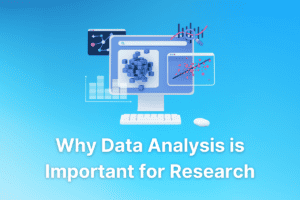5 Reasons Why Data Science Is Important for Your Business
We’re reader-supported; we may earn a commission from links in this article.
Data science is growing more and more important in the business world.
Every day, companies are collecting more data than ever before! The high volume of data we have is undeniable!
And it’s not just big global data companies like Amazon and Google that can take advantage of this data—small businesses can too!
In this article, I will cover five reasons why data science is important for businesses.
Read on for more information:
Why Is Data Science Important?
1. Data Science Enables Better Data-Driven Decisions
With data science, businesses can analyze data to find trends and patterns.
This information can then be used to make better decisions, including which products to sell, how to price them, and where to allocate resources.
For example, data science can be used to study customer behavior. This information can then be used to improve the customer experience by making changes such as adding new features or redesigning the website.
Data science can also be used to analyze financial global data. This information can be used to make better decisions about investments and spending.
In short, data science can be used to make better decisions in all areas of the business.
Example:
Let’s say you own a clothing company. You could use data science to analyze your sales data to find out which products are selling well and which ones aren’t.
You could also use data science to study customer behavior. This information could be used to improve the customer experience by making changes such as adding new features or redesigning the website.
Data science can also be used to analyze your competitors. This information can be used to make better decisions about where to allocate resources and how to price your products.
Data scientists can look at the data and train the data to predict how to outpace your competitors. These recommendations that a data scientist produces can help you make better decisions as a business.
2. Data Science Helps Businesses Understand Customers Better
By analyzing customer data, businesses can learn more about what customers want and need. This information can be used to create better products and services, and to target ads and offers to specific customers.
For example, data science can be used to study customer behavior. This information can be used to improve the customer experience by making changes such as adding new features or redesigning the website.
Data science can also be used to analyze customer surveys. This information can be used to understand what customers like and don’t like about your products and services.
By analyzing data, data scientists and data analysts alike can use multiple data science techniques in machine learning to create models that will assist in understanding the underlying customer behavior.
3. Data Science Helps Improve Business Operations
The importance of data science in business ultimately lies in its practicality – can it be used in business operations?
Yes, it can! Data science can be used to optimize business processes by identifying inefficiencies.
By training your business analysts in data science skills in big data, they can help improve the reliability of their recommendations.
For example, data could be used to track the number of returns a business is experiencing and identify why they are happening.
This information could then be used to make changes that would reduce the number of returns. In this way, data science can help businesses save time and money.
Data science can also be used to improve the accuracy of inventory management. This can reduce the amount of waste and the cost of goods sold.
A data scientist can then create models to predict when inventory needs to be updated and the rate at which a particular product is being used up.
This ensures no lag time when restocking inventory and no waste of expired inventory.
Data generated from daily business operations can be used by data scientists to derive valuable insights from data mining techniques.
Among these are techniques such as machine learning, data visualization, and dashboarding.
All in all, data analysis is hard to beat when picking the right decision for your business moving forward.
4. Data Science Helps Boost Business Profits
Data science can be used to identify opportunities for increasing profits. For example, businesses can use data analytics to identify which products are selling well and why, and then increase production of those products.
Data science can also be used to develop new products. By analyzing customer data, businesses can learn about unmet needs and create products that address those needs.
This is done by successfully visualizing trends within an industry to pick our areas of possible growth and leverage.
In addition, data science can be used to improve marketing efforts. This could involve segmenting customers based on their behavior or using predictive models to identify which customers are most likely to purchase a product.
By targeting marketing efforts toward these customers, businesses can increase their chances of making a sale.
In fact, some businesses like AI story generators totally rely on their AI technology to generate revenue. As it is software and sold online, the profit margins for incorporating this are very high!
5. Data Science Enables Companies to Stay Competitive in Today’s World
In order to stay ahead of the competition, businesses need to be utilizing data science in some way or another. If you’re not using data science, you’re behind the curve!
With many companies adopting data science into their business strategy, by not adopting a data-driven mindset, you may actually hurt your company’s growth opportunities.
Knowing how to leverage data science in analyzing your performance against your competitors allows you to know where you stand among them.
If you’re not analyzing competitors, you are already in the lurch, because you can bet that they are already analyzing you and your successes.
Concepts such as artificial intelligence and data visualization are such incredibly powerful tools that can catapult a business because of how quickly information can be conveyed through them.
If you’re a key leader in a business or organization, you will be able to quickly tell where the numbers lead you and make decisions in the best interests of outpacing your competitors.
If you do not understand the importance of data science, you may never discover why it’s to catch up to your competitors.
What is Data Science?
Data science is the process of extracting knowledge from data. It involves the use of mathematical and statistical methods to analyze data and draw conclusions from it.
Data science is a relatively new field, and it is constantly evolving as new technologies are developed. However, its importance has grown in recent years as businesses have become increasingly reliant on data.
What is a Data Scientist?
A data scientist is someone who is responsible for analyzing and interpreting data. A data scientist may also be responsible for developing new ways to collect and store data.
Data scientists typically have a background in computer science, mathematics, or statistics. They use their skills to develop algorithms that can help businesses make better decisions.
Data scientists often work with data mining, machine learning, and predictive modeling. These tools help businesses make sense of large data sets.
Data scientists typically work with business analysts to understand the needs of a business. They then use their skills to develop models that can help businesses make better decisions.
Why Are Data Scientists Important?
Data scientists are important because they help businesses make better decisions. By analyzing data, data scientists can identify trends and patterns. This information can be used to improve business processes or to develop new products.
In addition, data scientists can help businesses save money. By identifying inefficiencies in data collection or storage, data scientists can help businesses reduce their costs.
Data scientists are also important because they can help businesses automate tasks. By developing algorithms, data scientists can help businesses automate tasks that would otherwise be done manually. This can save businesses time and money.
They are important because they help businesses make better decisions. They do this by analyzing data to identify trends and patterns.
What’s the Difference Between Data Science and Computer Science?
Data science is a branch of computer science. It focuses on the use of algorithms to extract knowledge from data.
Computer science, on the other hand, focuses on the design and implementation of software. Computer science also covers theoretical topics such as computational complexity and information theory.
Data science is a relatively new field, and it is constantly evolving. Computer science, on the other hand, is a well-established field.
Data scientists typically have a background in computer science, mathematics, or statistics. They use their skills to develop algorithms that can help businesses make better decisions.
Computer scientists typically design and implement software. They may also study theoretical topics such as computational complexity and information theory.
Final Thoughts
These are just a few of the many reasons why data science is important for businesses.
Data science can be used in countless other ways to improve business operations, boost profits, and stay ahead of the competition.
If you’re not using data science in your business yet, now is the time to start!
There are many who study data science in the past few years instead of other fields of computer science and for good reason – many are picking up a data science career because they find data science interesting and of how fulfilling analyzing data is.
Here’s your chance to tap on their dreams to be a data scientist and enable your business today.
Thanks for reading this article and all the best in implementing your data science strategy in your organization.

Justin Chia
Justin is the author of Justjooz and is a data analyst and AI expert. He is also a Nanyang Technological University (NTU) alumni, majoring in Biological Sciences.
He regularly posts AI and analytics content on LinkedIn, and writes a weekly newsletter, The Juicer, on AI, analytics, tech, and personal development.
To unwind, Justin enjoys gaming and reading.


